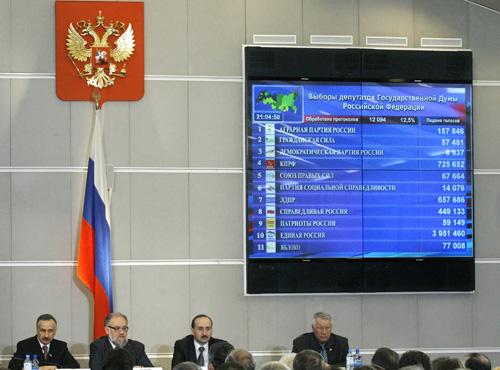Putin remains in control with party win

Dec 3, 2007
Last updated on May 12, 2016 at 07:14 p.m.
MOSCOW — Vladimir Putin’s party won a crushing victory in parliamentary elections Sunday, paving the way for the authoritarian leader to remain in control even after he steps down as president.
The vote followed a tense Kremlin campaign that relied on a combination of persuasion and intimidation to ensure victory for the United Russia party and for Putin, who has used a flood of oil revenues to move his country onto a more assertive position on the global stage.
“The vote affirmed the main idea: that Vladimir Putin is the national leader, that the people support his course, and this course will continue,” party leader and parliament speaker Boris Gryzlov said after exit polls were announced.
Several opposition leaders accused the Kremlin of rigging the vote, and the Bush administration called for a probe into voting irregularities. Communist Party leader Gennady Zyuganov called the election “the most irresponsible and dirty” in the post-Soviet era and party officials vowed to challenge the results.
Get The Daily Illini in your inbox!
With ballots from 72.5 percent of precincts counted, United Russia was leading with 63.1 percent, while the Communists trailed with 11.7 percent, the Central Election Commission said. Exit polls seemed to corroborate the partial results.
The Kremlin portrayed the election as a plebiscite on Putin’s nearly eight years as president – with the promise that a major victory would allow him somehow to remain leader after his second term ends next year.
Putin is constitutionally prohibited from running for a third consecutive term, but he clearly wants to stay in power.
A movement has sprung up in recent weeks to urge the president to become a “national leader,” though what duties and powers that would entail are unclear.
Pollsters said United Russia’s performance would give it an overwhelming majority of 306 seats in the 450-seat State Duma, or lower house. The Communists would have 57 seats.
Two other pro-Kremlin parties – the nationalist Liberal Democratic Party and populist Just Russia – also appeared to have made it into parliament, with 8.7 percent and 8 percent, respectively.
One Liberal Democratic Party deputy will be Andrei Lugovoi, a former KGB officer and chief suspect in the poisoning death of Kremlin critic Alexander Litvinenko in London last year. Russia has refused to hand Lugovoi over to Britain, and the Duma seat provides him with immunity from prosecution.
No other parties passed the 7 percent threshold for gaining seats in the legislature. Both opposition liberal parties were shut out, predicted to win no more than 2 or 3 percent of the vote each.
Many Russians complained Sunday about being pressured to cast their ballots, with teachers, doctors and others saying they had been ordered by their bosses to vote at their workplaces.
“People are being forced and threatened to vote; otherwise they won’t get their salaries or pensions,” said Boris Nemtsov, leader of the liberal Union of Right Forces party.
Dozens of voters reported being paid to cast ballots for United Russia, said Alexander Kynev, a political expert with election monitoring group Golos. In the town of Pestovo in the western Novgorod region, voters complained they were given ballots already filled out for United Russia, he said.
In Chechnya, where turnout was over 99 percent, witnesses reported seeing election authorities filling out and casting voter ballots in the suburbs of the regional capital, Grozny.
There was a tense, subdued mood at some polling stations. Yelena, a 32-year-old manager in St. Petersburg, refused to give her last name out of fear of official retaliation for voting for the liberal Yabloko party.
“We live in a country with an absence of democracy and freedom of speech,” she said.





